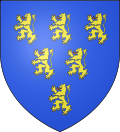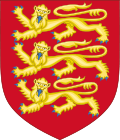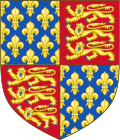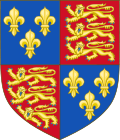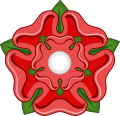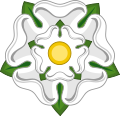- Henry the Young King
-
Henry 
Junior King of the English Reign 1170–1183 Coronation 14 June 1170
27 August 1172Senior king Henry II Consort Margaret of France Issue William of England (died young) House House of Plantagenet Father Henry II of England Mother Eleanor, Duchess of Aquitaine Born 28 February 1155 Died 11 June 1183 (aged 28)
Castle of Martel, LotHenry, known as the Young King (28 February 1155 – 11 June 1183) was the second of five sons of King Henry II of England and Eleanor of Aquitaine but the first to survive infancy. He was officially King of England; Duke of Normandy,[1] Count of Anjou and Maine.
Contents
Early life
Little is known of the young prince Henry before the events associated with his marriage and coronation. His mother's children by her first marriage to Louis VII of France were Marie of France, Countess of Champagne and Alix of France, Countess Blois. He had one older brother, William IX, Count of Poitiers (d. 1156), and his younger siblings included Matilda, Duchess of Saxony; Richard I of England; Geoffrey II, Duke of Brittany; Eleanor, Queen of Castile; Joan, Queen of Sicily; and John of England.
In June 1170, the fifteen-year-old Henry was crowned king during his father's lifetime, a practice originally practised by the French Capetian dynasty and adopted by the English kings Stephen and Henry II. A Latin poem by a court official written to commemorate the coronation hints at the charisma of this young prince. There he is described as a charming youth of striking beauty, tall but well proportioned, broad-shouldered with a long and elegant neck, pale and freckled skin, bright and wide blue eyes, with a thick mop of the reddish-gold hair characteristic of his dynasty.[citation needed]
He was known in his own lifetime as "Henry the Young King" to distinguish him from his father. Because he predeceased his father, he is not counted in the numerical succession of kings of England. Nonetheless, he was an anointed king and his royal status was not disputed.[citation needed]. There is a question about his knighting. According to one of Becket's correspondents, Henry was knighted by his father before the coronation, but the biographer of William Marshal asserts that the king was knighted by William in the course of the rebellion of 1173.[citation needed]
Tournament hero and celebrity
Henry did not appear to have been very interested in the day-to-day business of government, which distinguished him from his father and younger brothers. His father, however, is reputed to have failed to delegate authority to his son, retaining power in England. The majority opinion amongst historians is that of W. L. Warren (1973): "The Young Henry was the only one of his family who was popular in his own day. It was true that he was also the only one who gave no evidence of political sagacity, military skill, or even ordinary intelligence...", and elaborated in a later book, "He was gracious, benign, affable, courteous, the soul of liberality and generosity. Unfortunately he was also shallow, vain, careless, high-hoped, incompetent, improvident, and irresponsible."
The Young King's contemporary reputation, however, was by no means so negative. This had much to do with his place in the enthusiastic tournament culture of his own day. We can see this from his appearances in the History of William Marshal, the biography of the knight assigned to him as a tutor in 1170, and who became his tournament team leader until 1182. The History depicts him as constantly moving from one tournament to another across northern and central France between 1175 and 1182. With his first cousins, Philip, Count of Flanders, and Baldwin V, Count of Hainaut, Flanders and Namur, he was one of the key patrons of the sport. He is said to have spent over £200 a day on the great retinue of knights he brought to the tournament of Lagny-sur-Marne in November 1179.
If he lacked political weight, the Young King's patronage gave him celebrity status throughout western Europe. The baron and troubador, Bertran de Born, who knew him, said that he was "...the best king who ever took up a shield, the most daring and best of all tourneyers. From the time when Roland was alive, and even before, never was seen a knight so skilled, so warlike, whose fame resounded so around the world — even if Roland did come back, or if the world were searched as far as the River Nile and the setting sun." There was a perception amongst his contemporaries and the next generation that his death in 1183 marked a decline both in the tournament and knightly endeavor. His former chaplain, Gervase of Tilbury, said that "his death was the end of everything knightly". However, de Born was later highly critical of the Young King, and satirized him in several of his works.
Political career
The young Henry played an important part in the politics of his father's reign. On 2 November 1160, he was betrothed to Margaret of France, daughter of King Louis VII of France and his second wife, Constance of Castile, when he was 5 years of age and she was 2. The marriage was an attempt to finally settle the struggle between the Counts of Anjou and the French Kings over possession of the frontier district of the Norman Vexin, which Louis VII acquired from Henry II's father, Geoffrey Plantagenet, Count of Anjou, around 1144. By the terms of the settlement, Margaret would bring the castles of the Norman Vexin to her new husband. However, the marriage was pushed through by Henry II when Young Henry and Margaret were small children, so that he could seize the castles. A bitter border war followed between the kings.
They were formally married on 27 August 1172 at Winchester Cathedral, when Henry was crowned king of England a second time, this time together with Margaret, by Rotrou, the archbishop of Rouen.[2][3]
Young Henry fell out with his father in 1173. Contemporary chroniclers allege that it was due to the young man's frustration that his father had given him no realm to rule, and feeling starved of funds. The rebellion seems, however, to have drawn strength from much deeper discontent with his father's rule, and a formidable party of Anglo-Norman, Norman, Angevin, Poitevin and Breton magnates joined him. The civil war (1173–74) came close to toppling the king and he was narrowly saved by the loyalty of a party of nobles with holdings on the English side of the Channel, and the defeat and capture of the king of Scotland. Young Henry sought a reconciliation after the capture of his mother and the failure of the revolt. By the terms of the settlement, his funds were much increased and he apparently devoted most of the next seven years to the amusement of the tournament.
In November 1179, he represented his father at the coronation of Philip Augustus as associate king of France at Reims. He acted as Steward of France and carried the crown in the coronation procession. Later, he played a leading role in the celebratory tournament held at Lagny-sur-Marne, to which he brought a retinue of over 500 knights at huge expense.
The Young Henry's affairs took a turn for the worse in 1182. He fell out with William Marshal, the leader of his tournament mesnée.[4] The unknown author of L'Histoire de Guillaume le Maréchal suggests that Marshal's disgrace was because he had indulged in a clandestine affair with Queen Margaret. David Crouch, one of the Marshal's principal modern biographers, argues that the charge against William was actually one of lèse majesté, brought on by Marshal's own arrogance and greed. The charge of adultery was only introduced in the Life of William Marshal as a distraction from the real charges, of which he was most probably guilty. Though the Young King sent his wife early in 1183 to the French court, it was done most likely to keep her safe in the impending war with his brother, Richard, rather than because she was in disgrace.
The only child of Henry and Margaret was William, born prematurely on 19 June 1177, and dying three days later. This difficult delivery may have rendered her sterile as she had no further children.
Death and burial
Henry the Young King died in the summer of 1183, during the course of a campaign in the Limousin against his father and his brother Richard. He had just completed a pillage of local monasteries to raise money to pay his mercenaries. He contracted dysentery at the beginning of June. Weakening fast, he was taken to Martel, near Limoges. It was clear to his household that he was dying on 7 June when he was confessed and received the last rites. As a token of his penitence for his war against his father he prostrated himself naked on the floor before a crucifix. He made a testament and since he had taken a crusader's vow, he gave his cloak to his friend William Marshal with the plea that he should take the cloak (presumably with the crusader's cross stitched to it) to the Holy Sepulchre in Jerusalem. On his deathbed, he reportedly asked to be reconciled to his father, but King Henry, fearing a trick, refused to see him. He died on 11 June, clasping a ring his father had sent instead as a sign of his forgiveness. After his death, his father is said to have exclaimed: "He cost me much, but I wish he had lived to cost me more."
After his death there was an attempt by his mother and a faction of his friends to promote his sainthood. Thomas of Earley, archdeacon of Wells, published a sermon not long afterwards which detailed miraculous events attending the cortège which took his body north to Normandy. Henry had left orders that his entrails and other body parts should be buried at the abbey of Charroux, but the rest of his body should rest in Rouen Cathedral.[5] However, during the funeral procession, a member of Henry's household was seized by his mercenary captains for debts the late king had owed them. The knights accompanying his corpse were so penniless they had to be fed by charity at the monastery of Vigeois. There were large and emotional gatherings wherever his body rested. At Le Mans, the local bishop halted the procession and ordered the body buried in his cathedral, perhaps to help defuse the civil unrest Henry's death had caused. The dean of Rouen recovered the body from the chapter of Le Mans a month later by law suit so the Young Henry could be buried in Normandy as he had desired in his testament. His remains are in Rouen Cathedral, where his tomb is on the opposite side of the altar from the tomb[6] of his younger brother Richard, with whom he was perpetually quarrelling. The tomb of the archbishop of Rouen, who had married him and Margaret, lies nearby in the ambulatory. His brothers Richard the Lionheart and John Lackland both later became king.
Fictional portrayals
Henry was portrayed by Riggs O'Hara in the 1964 film Becket.
He was also portrayed by Alan Cox (as a young boy), Dominic Savage (as a teenager), and Kevin McNally (as an adult) in the 1978 BBC TV series The Devil's Crown, which dramatised the reigns of his father and brothers.
Henry is an important character in Sharon Kay Penman's novels Time and Chance and The Devil's Brood.
Ancestry
Ancestors of Henry the Young King 16. Fulk IV, Count of Anjou 8. Fulk of Jerusalem 17. Bertrade de Montfort 4. Geoffrey Plantagenet, Count of Anjou 18. Elias I, Count of Maine 9. Aremburga de la Fleche of Maine 19. Matilda of Chateau-du-Loire 2. Henry II of England 20. William I of England 10. Henry I of England 21. Matilda of Flanders 5. Empress Matilda 22. Malcolm III of Scotland 11. Matilda of Scotland 23. Margaret of England 1. Henry the Young King 24. William VIII, Duke of Aquitaine 12. William IX, Duke of Aquitaine 25. Hildegarde of Burgundy 6. William X, Duke of Aquitaine 26. William IV, Count of Toulouse 13. Philippa of Toulouse 27. Emma of Mortain 3. Eleanor of Aquitaine 28. Boson II de Châtellérault, Viscount of Châtellérault 14. Aimery I de Rochefoucauld, Viscount of Châtellérault 29. Aenora of Thouars 7. Aenor de Châtellerault 30. Bartelmy de l'Isle-Bouchaard 15. Dangereuse de L' Isle Bouchard 31. Gerberge de Blaison Notes
- ^ Charles Cawley (2008-10-28). "England Kings". Medieval Lands. Foundation of Medieval Genealogy. http://fmg.ac/Projects/MedLands/ENGLAND,%20Kings%201066-1603.htm#HenryKingdied1183. Retrieved 2010-01-20.
- ^ Alison Weir, Eleanor of Aquitaine: A Life (Ballantine Books, 1999) p. 195
- ^ W L Warren, Henry II (Univ. of California Press, 1973) p. 111, note 3
- ^ Mesnée is an Old Norman French word, meaning household.
- ^ Alison Weir, Eleanor of Aquitaine
- ^ This tomb contained a lead reliquary, with Richard's heart, that is stored with the treasure of the Cathedral. His body is in the Fontevraud Abbey.
References
- W.L. Warren, Henry II (London, 1973) ISBN 0-520-03494-5
- O.H. Moore, The Young King Henry Plantagenet, 1155–83, in History, Literature, and Tradition (Columbus OH, 1925)
- G. Duby, William Marshal: the Flower of Chivalry trans. R. Howard (London, 1986)
- D. Crouch, William Marshal: Knighthood, War and Chivalry, 1147–1219 (2nd edn, London, 2002)
- D. Crouch, Tournament (London, 2005)
- L. Diggelmann, 'Marriage as Tactical Response: Henry II and the Royal Wedding of 1160', English Historical Review, CXIX, (2004), pp. 954–64
- R.J. Smith, 'Henry II's Heir: the Acta and Seal of Henry the Young King, 1170–83', English Historical Review, CXVI, (2001), pp. 297–326
Henry the Young KingBorn: 28 February 1155 Died: 11 June 1183Regnal titles Preceded by
Henry Curtmantle
as sole rulerKing of England
Duke of Normandy
Count of Anjou and Maine
1170–1183
with Henry CurtmantleSucceeded by
Henry Curtmantle
as sole rulerEnglish monarchs Kingdom of the
English
886–1066- Alfred the Great
- Edward the Elder
- Ælfweard
- Athelstan the Glorious1
- Edmund the Magnificent1
- Eadred1
- Eadwig the Fair1
- Edgar the Peaceable1
- Edward the Martyr
- Æthelred the Unready
- Sweyn Forkbeard
- Edmund Ironside
- Cnut1
- Harold Harefoot
- Harthacnut
- Edward the Confessor
- Harold Godwinson
- Edgar the Ætheling
Kingdom of
England
1066–1649- William I
- William II
- Henry I
- Stephen
- Matilda
- Henry II2
- Henry the Young King
- Richard I
- John2
- Henry III2
- Edward I2
- Edward II2
- Edward III2
- Richard II2
- Henry IV2
- Henry V2
- Henry VI2
- Edward IV2
- Edward V2
- Richard III2
- Henry VII2
- Henry VIII2
- Edward VI2
- Jane2
- Mary I2 with Philip2
- Elizabeth I2
- James I3
- Charles I3
Commonwealth of
England, Scotland and Ireland
1653–1659Kingdom of
England
1660–1707- Charles II3
- James II3
- William III and Mary II3
- Anne3
1Overlord of Britain. 2Also ruler of Ireland. 3Also ruler of Scotland. 4Lord Protector.
Debatable or disputed rulers are in italics.Dukes of Normandy House of Normandy
911–1135Rollo · William I · Richard I · Richard II · Richard III · Robert I · William II · Robert II · Henry I · William IIIHouse of Blois
1135–1144House of Plantagenet
1144–1259Categories:- 1155 births
- 1183 deaths
- Heirs to the English throne
- Dukes of Normandy
- Counts of Anjou
- Counts of Maine
- Heirs apparent who never acceded
- House of Plantagenet
Wikimedia Foundation. 2010.



